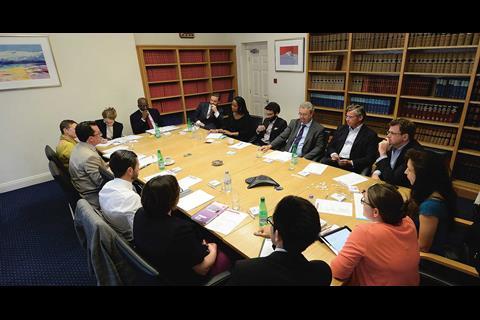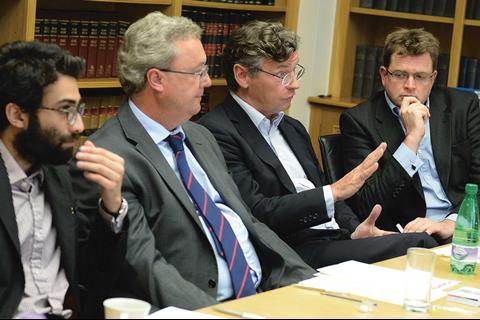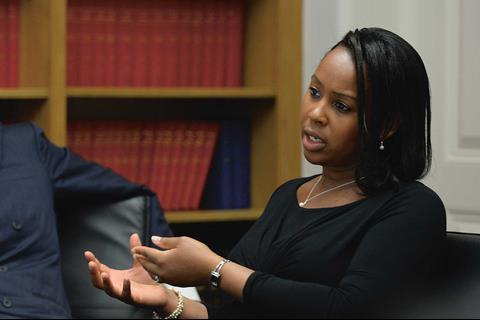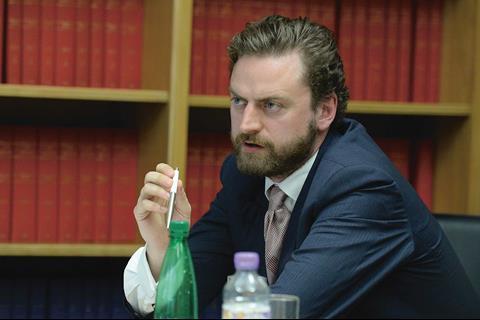The success of commercial barristers is reliant on an independent and viable publicly funded bar now under sustained attack. What to do?
A health check on the bar would yield polarised results. For criminal barristers, the past year has been extraordinary. Huge fee cuts prompted a series of unprecedented walkouts by barristers, and a Crown court judge felt compelled to stay a multi-million-pound fraud case because barristers would not take it for the reduced fees on offer.
That decision was successfully appealed by the prosecution, but the episode is indicative of the pretty pass reached between the publicly funded bar and the government. It also highlights the ever-widening gulf between the publicly and privately funded branches of the profession.
While the fortunes of the criminal bar wane, the star of those at the commercial bar, due in large part to its international work, remains in the ascendant. This ensures that overall income remains on an upward trajectory.
The challenge for the criminal bar, according to those round the table, is to change the political narrative and demonstrate its value to politicians and the wider public.
Max Hardy, a criminal barrister who chairs the Young Barristers Committee, believes the protests that prompted hundreds of bewigged barristers to chant and wave placards outside court struck the wrong note. That concentrated minds on the impact of the changes on lawyers’ wallets and purses, rather than the ‘bigger picture’.
The emphasis, he says, should have been on the impact of the cuts on access to justice. What the bar needs to show the public, Hardy says, is that: ‘It could be you who needs a barrister – you could be going to court without one.’
Sarah Crowther, commercial tenant at 3 Hare Court, agrees that it is difficult for the public to see themselves as ‘potential beneficiaries’ of the bar’s services. ‘People don’t like to think of themselves as needing a lawyer,’ she notes, contrasting this with the happy position of doctors, who can always reply on a sympathetic public.
To make progress, the bar needs to ‘push a wider political agenda’, because at present the narrative is very much about ‘lawyers looking after themselves and their own interests’.
She adds: ‘There’s no part of that narrative which suggests that barristers’ services are fundamental and that the rule of law depends on them.’
That said, fees are hardly unimportant. Hardy says: ‘If you ask the man in the street to imagine and describe a barrister, they would almost certainly describe the work of a criminal barrister, but imagine the earnings of a commercial barrister.’
The reality is rather different, he insists; a criminal pupil working in the magistrates’ court will earn in two months what a commercial partner in a magic circle firm earns in hours.
For senior barristers, the fees for very high cost cases (VHCCs), cut by at least 30% in December, starkly illustrate the disparity between the publicly and privately funded bar, according to Brian Lee, chair of the Institute of Barristers’ Clerks and clerk at commercial set 20 Essex Street.
Lee cites Operation Cotton, originally stayed by a judge at Southwark Crown Court for want of counsel. He notes that the £71-an-hour fee (before expenses) that he calculated would have been paid to silks minded to take the brief, would only be tempting for a junior in most civil sets. The latter charge out for £50-£75 an hour.
Hardy, currently on secondment with the Financial Conduct Authority, which is prosecuting the Operation Cotton case, takes exception to the appellation ‘VHCC’. Why, he asks, are such cases not called ‘extremely difficult and complicated’? After all, he adds: ‘You don’t say to a consultant oncologist who is performing life-saving cancer surgery on a child, “Well, you’re doing expensive time-consuming surgery”.’
Since the bar roundtable took place, the first Operation Cotton trial has been rescheduled and at press time there was talk of an imminent deal between bar and government on fee cuts.
Those attending certainly viewed the Ministry of Justice’s response to the bar’s refusal to undertake VHCCs, expanding the Public Defender Service, as an expensive mistake. Moreover, the loss of independence of the defence advocate poses a threat to public confidence in the justice system. State employees, Hardy explains, will encounter all kinds of pressures dictating how the case is handled.
Michael Todd QC, head of Erskine Chambers and former Bar Council chair, emphasises the importance to the rule of law of maintaining that confidence. This depends not only on the fact that the lawyers and judges are independent, but also that they are seen to be independent.
‘As soon as you take away that perception of independence, then confidence in the system goes,’ he comments.
Cuts have been made not just in crime, but across all publicly funded work, resulting in a well-documented rise in the incidence of litigants in person.
What is also happening, Hardy stresses, is that barristers are walking away from the profession ‘quietly and unseen’. The court walkouts were a ‘sensational spectacle’, but the real ‘cancer’ in the profession is the failure of this part of the bar to renew itself.
Those present forecast a slump in the quality of barristers doing publicly funded work, with a concomitant fall in the esteem in which those doing that work are held.
‘It’s only when you’ve lost what you’ve always relied upon, that you realise the value of it,’ suggests Richard Wilson QC, a commercial tenant at 36 Bedford Row.
The cuts have prompted the publicly funded bar to diversify. As Leon Glenister, a junior barrister at Hardwicke Chambers, points out, a purely publicly funded practice is no longer viable.
Amanda Illing, Hardwicke’s chief executive, is keen for her tenants to have ‘different income streams’ and develop a ‘portfolio of practice’ that may include private work and secondments.
‘The bar is changing,’ she says. ‘We’re becoming providers of legal services in lots of different ways.’
For criminal barristers, according to Hardy, diversification is already ‘commonplace, even in the most dyed-in-the-wool’ sets, as barristers move away from reliance on legal aid work.
As the publicly funded bar struggles, the commercial bar thrives. The reputation of the bar and English law continue to help the latter expand its footprint internationally.
International work, Todd says, is the future for the bar. There are, he suggests, even opportunities abroad for criminal practitioners.
It is, however, international arbitration that has been the key to the bar’s overseas success, despite uncertainties over perceived conflicts in jurisdictions unused to barristers from the same set acting for different sides.
While the popularity of barristers in England and Wales remains, however, London as a venue for arbitration is losing its lustre, with parties favouring the sunnier climes of the far east.
Lee has six barristers currently working on arbitrations in Singapore. Five years ago, he says, that work would have been done in London. A large Korean law firm with which he recently spoke confirmed that perception: ‘Four to five years ago, their choice of law was English law, and their venue was always London or New York. Now, while the choice of law remains English, the venue is Singapore. The work is still there, but barristers have to go overseas now to capture it.’
Wilson suggests that international commercial mediation, which is perceived by many as quicker, cheaper and more successful than arbitration, could be another growth area.
Though this is a ‘new concept’, Lee notes that his set has a full-time mediator who has completed a number of mediations overseas. Enquiries are coming through from English and offshore law firms, both in Singapore and Hong Kong.
‘I think perhaps Singapore and Hong Kong are where we were 10 years ago when it comes to mediation. They’ve heard of it but they’ve never really gone down the route,’ he observes.
Agreeing that mediation presents an opportunity for barristers, Todd notes that in many far eastern markets, the traditional litigation practice of trial by oral combat – pulling someone apart in the witness box – is anathema.
There is definite scope for the bar in exploring better means of dispute resolution, he suggests, particularly evaluative meditation, which he notes is less ‘touchy-feely’ than its facilitative counterpart.
Wilson notes, however, that for many barristers making the transition to mediation can be tricky. The process can feel counterintuitive because barristers have to resist the temptation to take control.
At the table were:
Catherine Baksi, Law Society Gazette; Sarah Crowther, 3 Hare Court; Leon Glenister, Hardwicke: Amanda Illing, Hardwicke; Alistair Coyne, Littleton Chambers; Richard Clegg, Selborne Chambers; Eduardo Reyes, Law Society Gazette; Linda Casbolt, Thomson Reuters; Rachel Francis, 1 Pump Court; Richard Wilson QC, 36 Bedford Row; Max Hardy, 9 Bedford Row; Gemma de Cordova, Tanfield Chambers; Zimran Samuel, 42 Bedford Row; Brian Lee, 20 Essex Street; Michael Todd QC, Erskine Chambers; Tom Little, 9 Gough Square
Securing high-flying international work, and immune from the pressure of enforced fee cuts, the commercial bar is far from unconcerned with the travails of its impecunious colleagues. The spirit of ‘one bar’, voiced by successive bar chiefs, wafts zephyr-like through the profession.
Todd puts it succinctly: ‘The reason why we get that work is because of the reputation of our legal system and our adherence to the rule of law.’ Fundamental to that reputation, he says, is access to justice.
While the Russian oligarchs who come to use London’s commercial court may not care per se whether an alleged criminal is represented by counsel, says Todd, they do care about the rule of law.
What brings them to London, he says, is the ‘incorruptibility of the system, the independence of the judiciary and the independence of the lawyers’.
Wilson agrees: ‘The rule of the law is an absolute thing. It’s not something that applies only to the rich and powerful or the popular.
‘Potential clients around the world see England and Wales as a jurisdiction where everybody has equality under the rule of law and everybody has access to justice. You lose those clients if you ride roughshod over the rights of the unpopular or the unknown.’
Tom Little, of 9 Gough Square, adds: ‘It’s in the interests of the commercial world for the publicly funded bar to survive.’ The reality, he argues, is that the silk system, so valued by overseas clients, will become untenable if it is only supported by a handful of chambers and is effectively reserved to commercial lawyers.
‘Everyone needs to think long and hard about how they assist other parts of the bar,’ he adds.
Looking ahead to the celebrations planned for next year’s 800th anniversary of the Magna Carta, Hardy alludes to the esteem in which the document and its principles are held around the world. The world looks to England and Wales as being an exemplar of those principles: ‘If they knew how jeopardised justice was in this country, they would be absolutely horrified.’
Rachel Francis, pupil barrister at 1 Pump Court and a committee member of the Young Legal Aid Lawyers group, is angered by what she sees as the MoJ’s hypocrisy – leading the Magna Carta celebrations, while simultaneously ‘making such a concerted effort to erode the principles’ of the rule of law and access to justice.
In recent years, the bar has had some success in increasing diversity within its ranks. Yet, according to Wilson, it remains ‘segmented and stratified on gender, race and class lines’.
Opportunities available to young lawyers are not equally distributed, he suggests, pointing to Legal Services Board research showing that white graduates from higher socioeconomic groups are over-represented. At the commercial bar, the consensus is that this is even more the case.
Wilson cites Bar Standards Board research from 2007 showing that students from less well-off backgrounds are more debt-averse and therefore less likely to take a punt on a career at the bar.
Public funding cuts will serve only to deter them further. All agree that the diversity of the profession lies mainly within the publicly funded sector. If its future is threatened, that is bad news indeed.
In the five years he has spent at the bar, Glenister says he has been proud to witness the profession becoming more diverse. But amid soaring education costs, mounting debts, ever increasing competition and legal aid cuts, he fears that will go into reverse.
Francis outlines the difficulty for aspiring barristers already entering a profession with thousands of pounds worth of debt following university. They will then encounter the disparity between postgraduate training costs of around £18,000 for the bar professional training course and the minimum pupillage award of £12,000.
YLAL’s social mobility survey One Step Forward, Two Steps Back, published in 2013, is aptly titled, Francis adds.
Illing contends that there is a strong business case for more diversity in the commercial bar, which has lagged behind the publicly funded sector. Sooner or later, she predicts, clients in the international arena will begin to question why the diversity of the general population of England and Wales is not mirrored by the bar.
‘We may find ourselves on the back foot if we don’t address that issue now,’ she warns.
So what can be done?
There is consensus that by the time it comes to recruiting for pupillage, it is too late for chambers to have a meaningful impact on the future demographic. By then, they say, it is a ‘numbers game’. The fierce competition for the holy grail that is pupillage means chambers are inundated with hundreds of applications for just a couple of places.
Selecting on merit, which all are adamant is essential, makes it difficult to promote diversity and social mobility.
Todd outlines the dilemma: ‘How do you define merit? How do you define who’s going to be a good barrister? What does being a good barrister involve? What are the characteristics that you need to get?’
Answering his own question, he says: ‘Unfortunately, the answer that always come back is – you need a first-class degree from a good university.’
The volume of applications, he adds, means the first ‘sift’ will inevitably be a paper one and chambers will tend to look at the people with those degrees: ‘So, inevitably, you’re going to get a particular class of person.’
Even if you try to judge candidates by commitment shown to extra-curricular activities and voluntary work, others point out, you still end up selecting those from more privileged backgrounds, After all, they are the ones who, with parental support, can afford to undertake such worthy activities.
There is support for new selection training required by the Bar Standards Board and the idea of unconscious bias training to help deter people recruiting in their own image.
Wilson favours the ‘blind CV’ policy being implemented by some City law firms to tackle bias. Those interviewing are not told the candidates’ university or degree, countering what Wilson calls the ‘halo effect’ that tempts interviewers to be more impressed by a candidate’s performance because of what they have read about them on paper.
Bursaries, scholarships, university mentoring programmes and the like are admirable, but most agree they also happen too late to make a real difference.
‘It has to start in schools – building aspiration and showing that children can have a career at the bar regardless of background, ethnicity or gender,’ says Gemma de Cordova, a commercial tenant at Tanfield Chambers.
There is, Glenister observes, still a perception among many that the bar is reserved for a ‘certain class or a certain look’ of people. Some of the bar’s traditions, adds Hardy, reinforce this and appear intimidating to the outsider. He wants to demystify the bar’s history and get school children into the Inns to show them ‘this is a place where you can belong as much as anybody else’.
The profile of those entering the profession will naturally have an impact on the appearance of the higher echelons. If the profession is not diverse, the judiciary won’t be either.
While recent figures show that a record number of women were appointed to the senior judicial ranks, it is ‘an international embarrassment’ that there is only one female Supreme Court judge, Hardy says.
All oppose quotas as a means to redress gender and ethnic imbalances however. Crowther suggests a ‘controversial’ notion that senior judges are chosen on the basis that they are good judges, rather than those who have been good barristers or built up good commercial practices.
A ‘clear, systematic career progression’, she says, would encourage women to get on the judicial ladder.
Like the solicitors profession then, the bar is confronted on all fronts by challenges to the time-honoured way of doing things. But there is at least one area where that change has been most welcome – knowledge management, facilitated by state-of-the-art technology.
Gone are the days of spending tedious hours in the Inn’s libraries to photocopy reams of cases and schlepping heavy tomes from one end of the country to the other.
The bar, says Linda Casbolt of Thomson Reuters, is one of the most mobile of professions and today so is all their information. Everything these days is digitised, everything is mobile, she says.
On their iPads, doubtless alongside Angry Birds and Spotify, the room is relieved to have electronic versions of Archbold or the White Book. The more demanding in the room demand that their solicitors ping over electronic case files too. It is, says, Glenister, literally a ‘huge weight off our shoulders’.
Would that the rest of the bar’s issues could be so neatly addressed.
- This roundtable was sponsored by Thomson Reuters and kindly hosted by 20 Essex Street
Catherine Baksi is a Gazette reporter



































2 Readers' comments